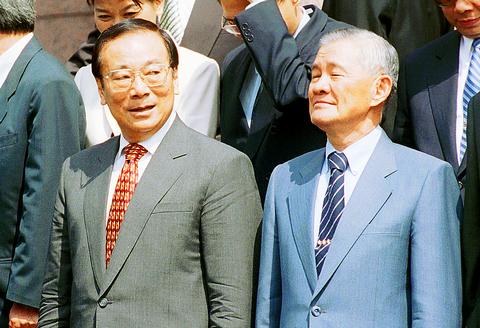The Presidential Office yesterday named Vice Premier Chang Chung-hsiung (
Chang immediately took office and held his first weekly Cabinet meeting, where outgoing Premier Tang Fei (
Chang said that the Cabinet reshuffle triggered by Tang's resignation would be small and announced no later than today in order to maintain political stability.

PHOTO: GEORGE TSORNG, TAIPEI TIMES
The new premier yesterday confirmed, however, that Minister of National Defense Wu Shih-wen (
Su Tzen-ping (
Sources in the Cabinet revealed that Minister of Economic Affairs Lin Hsin-yi (
In addition, deputy secretary general of the National Security Council (NSC, 國安會) Chiou I-jen (邱義仁), is to be the Cabinet secretary-general, replacing Wea Chi-lin (魏啟林).
Editor in chief of the Taipei Times Antonio Chiang (司馬文武) will replace Chiou as the new deputy secretary-general of the NSC.
Meanwhile, Chairman of the Council for Economic Planning and Development Chen Po-chih (
"New appointments of Cabinet members will be based on their professionalism instead of their party affiliation," Chang said at a press conference after yesterday's Cabinet meeting, adding that he would fulfill the president's ideal of "government for all the people" (
In addition, Chang set goals to initiate the so-called "Chen-Chang administration" -- essentially a minority government. "I hereby proclaim that political stability and economic development will be the Cabinet's top administrative priorities," Chang said, adding that he felt cautious and apprehensive after he was informed about his appointment, which was given on short notice.
"However, I will put all the Cabinet's effort into reinforcing coordination among the Cabinet, the legislature and opposition parties, as well as strengthening cooperation among parties," Chang said.
Chang said that the 2001 national spending plan, which was returned to the Cabinet by the legislature yesterday, would be modified and submitted again as soon as possible.
Expressing his gratitude for Tang's contribution during the past four months, Chang said, "Tang has brought peace and stability to the country [
Tang yesterday morning expressed his sorrow at leaving the Cabinet and modestly called himself a "deserter" (
"I've fought a good fight. I have finished my course and I'm left with only good memories," he said.
During yesterday's Cabinet meeting, the controversy over the Fourth Nuclear Power Plant was put on the agenda for discussion, but Chang postponed it.
However, according to DPP Chairman Frank Hsieh (謝長廷), Chang is unlikely to announce the continuation of the plant's construction since he is a DPP member.

US President Donald Trump yesterday announced sweeping "reciprocal tariffs" on US trading partners, including a 32 percent tax on goods from Taiwan that is set to take effect on Wednesday. At a Rose Garden event, Trump declared a 10 percent baseline tax on imports from all countries, with the White House saying it would take effect on Saturday. Countries with larger trade surpluses with the US would face higher duties beginning on Wednesday, including Taiwan (32 percent), China (34 percent), Japan (24 percent), South Korea (25 percent), Vietnam (46 percent) and Thailand (36 percent). Canada and Mexico, the two largest US trading

ACTION PLAN: Taiwan would expand procurement from the US and encourage more companies to invest in the US to deepen bilateral cooperation, Lai said The government would not impose reciprocal tariffs in retaliation against US levies, President William Lai (賴清德) said yesterday, as he announced five strategies to address the issue, including pledging to increase Taiwanese companies’ investments in the US. Lai has in the past few days met with administrative and national security officials, as well as representatives from various industries, to explore countermeasures after US President Donald Trump on Wednesday last week announced a 32 percent duty on Taiwanese imports. In a video released yesterday evening, Lai said that Taiwan would not retaliate against the US with higher tariffs and Taiwanese companies’ commitments to

‘SPECIAL CHANNEL’: Taipei’s most important tasks are to stabilize industries affected by Trump’s trade tariffs and keep negotiations with Washington open, a source said National Security Council Secretary-General Joseph Wu (吳釗燮) arrived in the US for talks with US President Donald Trump’s administration, a source familiar with the matter said on Friday. Wu was leading a delegation for a meeting known as the “special channel,” the Financial Times reported earlier. It marked Trump’s first use of the channel since returning to the White House on Jan. 20. Citing a source familiar with the matter, the Financial Times reported that Minister of Foreign Affairs Lin Chia-lung (林佳龍) was also a part of the delegation. The visit came days after China concluded war games around Taiwan and amid Trump’s

CHIP EXCEPTION: An official said that an exception for Taiwanese semiconductors would have a limited effect, as most are packaged in third nations before being sold The Executive Yuan yesterday decried US President Donald Trump’s 32 percent tariff on Taiwanese goods announced hours earlier as “unfair,” saying it would lodge a representation with Washington. The Cabinet in a statement described the pledged US tariffs, expected to take effect on Wednesday next week, as “deeply unreasonable” and “highly regrettable.” Cabinet spokeswoman Michelle Lee (李慧芝) said that the government would “lodge a solemn representation” with the US Trade Representative and continue negotiating with Washington to “ensure the interests of our nation and industries.” Trump at a news conference in Washington on Wednesday announced a 10 percent baseline tariff on most goods